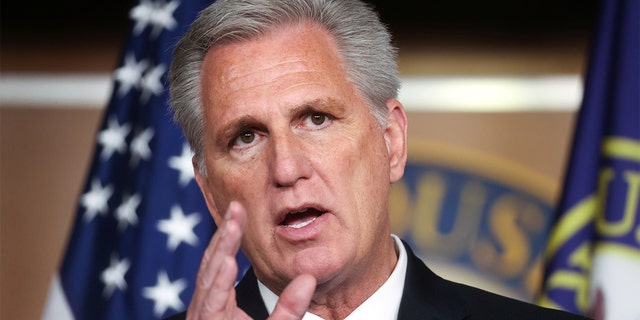
EXCLUSIVE: Thirty-one House Republicans are doubling down on their threat to oppose any legislation in the next Congress that is favored by GOP senators who vote for a massive $1.7 trillion spending bill this week.
The group of House Republicans, led by Texas Rep. Chip Roy, says the threat is serious. In a letter sent to Senate Republicans on Wednesday, which was obtained exclusively by Fox News Digital, the lawmakers said they would block “even the smallest legislative and policy efforts.”
“We reiterate that if any omnibus passes in the remaining days of this Congress, we will oppose and whip opposition to any legislative priority of those senators who vote for this bill – including the Republican leader,” the lawmakers wrote.
Their threat could have major repercussions for next year, as the GOP-controlled House will only be able to lose a handful of votes on any piece of legislation before having to rely on Democrats to secure passage.
ZELENSKYY TO ADDRESS CONGRESS WEDNESDAY AS LAWMAKERS DEBATE $45B IN UKRAINE AID

House Republicans led by Texas Rep. Chip Roy are threatening to block the priorities of Senate Republicans who vote for the $1.7 trillion spending bill. (Photo By Tom Williams/CQ-Roll Call, Inc via Getty Images)
“Kill this terrible bill or there is no point in pretending we are a united party, and we must prepare for a new political reality,” the lawmakers wrote.
Roy argued the threat should not be seen as House Republicans vowing revenge if the spending bill passes. Instead, the Texas lawmaker said the hardball tactic was the only way that House Republicans could show they were serious in opposing the pricey bill.
GOP SCORES WIN IN $1.7T BUDGET DEAL BY CUTTING IRS FUNDING — BUT THE AGENCY STILL CASHES IN
“It’s the only tool I have to pressure them to stop doing this to us,” said Roy. “The House GOP majority, if allowed, could set a new tone in which we rebuild our military, project strength, and help our allies – but not at the expense of fiscal strength.”
Roy and 13 House Republicans initially made the threat earlier this week in a letter to the Senate. House Minority Leader Kevin McCarthy, the GOP’s designated choice for speaker, quickly threw his support behind the tactic.
“When I’m Speaker, their bills will be dead on arrival in the House if this nearly $2 [trillion] monstrosity is allowed to move forward over our objections and the will of the American people,” said McCarthy, R-Calif.

House Minority Leader Kevin McCarthy, R-Calif., said that as House speaker, bills from Senate Republicans who support the funding bills will be “dead on arrival” in the House. (REUTERS/Jonathan Ernst)
Since then, more than a dozen other House Republicans have pledged to similarly block legislation favored by senators that back the bill. The threat comes as Congress readies to pass the $1.7 trillion package this week.
The spending bill includes more than $858 billion for defense spending, while appropriating $787 billion for domestic spending and $45 billion in additional aid to Ukraine. House Republicans have said that Congress should not move forward with the bill and instead pass a short-term funding bill that keeps the government running until mid-January.
The timeline would give Republicans more leverage in negotiations since the party is set to control the House come January. Given that Republicans do not yet control of the House, the only way to delay the bill is to withhold support from GOP lawmakers within the 50-50 Senate.
REP. BRADY WARNS SUPREME COURT COULD BE SUBJECT TO TRUMP TAX RETURN PRECEDENT

Alabama Sen. Richard Shelby said he does not think the House message “intimidates anyone.” (Photo by Chip Somodevilla/Getty Images)
At least 10 Republican Senate votes are to overcome the chamber’s 60-vote filibuster threshold. Twenty-one Senate Republicans voted to advance the bill on Tuesday, a sign the votes are there right now.
Several Senate Republicans who voted in favor of the spending bill said the threat of House Republicans blocking legislation next year did not factor into their decision. A few even dismissed the threat as a political stunt, noting that McCarthy was working to win the support of hard line conservatives in his bid to secure the speakership.
CLICK HERE TO GET THE FOX NEWS APP
“He’s focused on being speaker, and if I were in his shoes that’s what I would be focused on, trying to get enough votes,” said Alabama Sen. Richard Shelby, the top Republican on the Senate Appropriations Committee who is also retiring at the end of this Congress. “But I don’t think that intimidates anyone.”
Roy and other House Republicans said GOP senators can ignore the threat at the peril of their own legislation next year.








